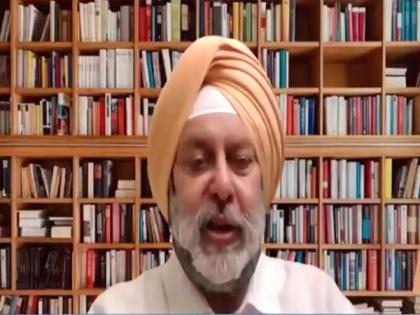Need of hour is political sagacity on part Nepali leadership: Former Indian envoy on protests
By ANI | Updated: September 9, 2025 22:10 IST2025-09-09T22:07:00+5:302025-09-09T22:10:08+5:30
Kathmandu [Nepal], September 9 : Amid unrest in Nepal following anti-government protests and resignation of Prime Minister KP Sharma ...

Need of hour is political sagacity on part Nepali leadership: Former Indian envoy on protests
Kathmandu [Nepal], September 9 : Amid unrest in Nepal following anti-government protests and resignation of Prime Minister KP Sharma Oli, Former Indian Ambassador to Nepal Manjeev Singh Puri has said that the need of the hour is political sagacity on the part of Nepali leadership and they need to understand the mood of the people.
Puri toldthat Nepal's remittances to GDP ratio is among the highest in the world, but the people realised during COVID-19 that the economy had structural issues.
"Nepalis have become much more globalised... Money has also come into the economy... This is something very interesting that has happened in this country, which, under the monarchy, had literally no exposure to globalisation... But now, frustration is growing due to the same political establishment continuing. COVID made Nepal realise in a serious manner that its economy, relying on remittances, was not an easy task... The need of the hour at the moment is political sagacity on the part of leadership," he said.
"They need to understand the mood of the people... I'm really referring to the Paharis in Nepal because they are reacting negatively. It's important for the political class to address that, assuage them, be accountable and be mature in doing what they have to do," he added.
Puri said politicians in democracies need to remember that they need to keep a finger on the pulse of the people.
"Who exactly would benefit as a result of these protests? Isn't relative stability, because political instability was almost built into the country's political, democratic, and electoral system, something that would have benefited others... (These protests) show that democracy is alive in a very interesting sense of the term, and people can take things into their own hands because the politicians are not listening," he said, answering a query on Nepal protests being called Gen-Z protests, and speculations of a foreign hand being behind these protests.
"Isn't that exactly what happened in Sri Lanka and Bangladesh?... Politicians in democracies need to remember, you need to keep a finger on the pulse of the people who are critical, and for Nepal, that's young people in Kathmandu... When there were mayoral elections in Kathmandu some years back, it wasn't Oli's party or Sher Bahadur Deuba's Nepali Congress that won, but an ex-rapper, Balen Shah, who won with an overwhelming majority," he added.
The former Indian envoy stated that nearly quarter of the Nepal population is overseas. "There's a unique empowerment among the people and an understanding of globalisation, especially among the young."
He emphasised that the government's decision to restrict social media platforms, combined with an inadequate response to growing frustrations, has fueled the protests.
"After COVID, Nepal hasn't been able to recover very well. There is unemployment. There is general frustration among the youth... In the midst of this, when you do something as drastic as shutting down social media, obviously, people will come out and protest... The situation was also badly handled," he said.
"The responsibility for this has to be taken politically... With around 19 deaths already confirmed and maybe more, about 100 plus people in hospitals, this situation requires not just empathy, but also a degree of accountability... This is the need of the hour for the political leaders in Nepal to do," he added.
Oli tendered his resignation earlier in the day, a move confirmed by his secretariat. Local media reported that four ministers had already stepped down before Oli's announcement.
Oli's exit is expected to set off political negotiations as parties try to form a new government. The 73-year-old had said he would personally lead all-party talks to bring a "meaningful conclusion" to the unrest, but his resignation shows the deep political instability in the Himalayan nation.
Nepal has witnessed "Gen Z protest", a widespread movement led by young people, primarily students, to demand accountability and transparency from the government. The protests began on September 8, 2025, in Kathmandu and other major cities, including Pokhara, Butwal, and Birgunj, after the government imposed a ban on major social media platforms, citing tax revenue and cybersecurity concerns.
Disclaimer: This post has been auto-published from an agency feed without any modifications to the text and has not been reviewed by an editor
Open in app